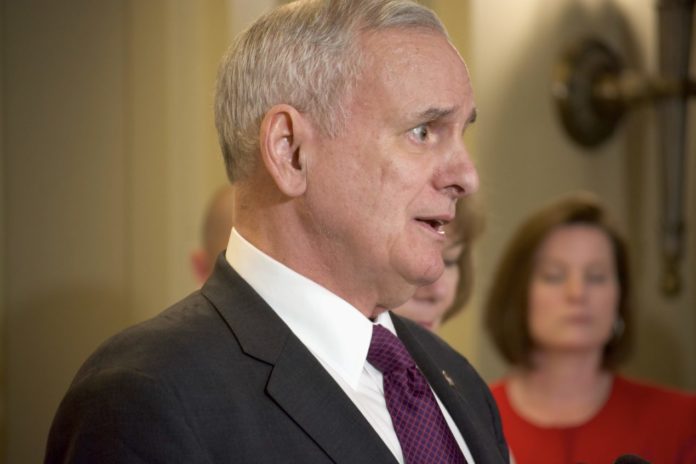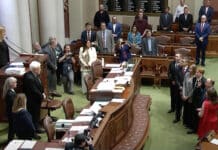ST. PAUL, Minn. – With the legislative session rapidly coming to a close, Real ID and bonding bills were the meat of Wednesday’s session.
House Floor
Lawmakers managed to pass Real ID with a majority.
Legislators were unable to pass the $800 million bonding bill Wednesday. A three-fifths majority is required by the state Constitution to pass any legislation that borrows money for projects. By a vote of 70-62, the bonding bill fell 11 votes short of the Constitutional requirement.
As Alpha News reported earlier this month, the bonding bill would fund transportation, water-related projects, and facilities preservation.
Ten Republicans joined Democrats in voting against the bill, while three Democrats joined Republicans in voting for the bill.
“It’s above my paygrade,” Democrat Minority Leader Melissa Hortman (D-Brooklyn Park) told reporters when asked if there was a magic number for passing a bonding bill this legislative cycle.
Bonding bills are normally passed during even-numbered years, however, lawmakers were unable to pass the billion dollar bonding bill within the final hours of the 2016 session.
Legislators have until Monday night to draft a new bonding bill.
Senate Floor
Two new bills were introduced on Wednesday. Sen. Foung Hawj (D-St. Paul) introduced a bill which would allocate $1 million in 2018 to the Minnesota China Friendship Garden Society for the development of a Chinese garden in Phalen Park in St. Paul.
Sens. Kari Dziedzic (D-Minneapolis), Scott Dibble (D-Minneapolis), and Torres Ray (D-Minneapolis) introduced a bill that would appropriate $250,000 for fiscal years 2018 and 2019 for Project SUCCESS. Project Success is a program is geared towards preparing inner-city students for college.
The Senate also passed Real ID along with several other bills ranging from the criminalization of meddling with public safety vehicles, to increasing the legal limit on how much milk a truck can transport.
Real ID
Minnesotans who fear that they would have to get a second form of identification to fly domestically can breathe a sigh of relief as Governor Mark Dayton signed the Real ID bill into law Thursday morning.
On Wednesday, the House voted 120-11 to pass Real ID legislation. The House had little debate on the floor about whether Real ID should move forward. Reps. Cal Bahr (R-East Bethel), Steve Drazkowski (R-Mazeppa), Mary Franson (R-Alexandria), Glenn Gruenhagen (R-Glencoe), Jeff Howe (R-Rockville), John Lesch (D-St. Paul), Eric Lucero (R-Dayton), Cindy Pugh (R-Chanhassen), Peggy Scott (R-Andover), and Abigail Whelan (R-Ramsey) voted against Real ID.
“I’ve opposed Real ID from the beginning because Real ID is a clear threat to liberty. Among the several threats to liberty is the fact federal Real ID empowers the Secretary of the Department of Homeland Security to unilaterally expand the scope and purpose of Real ID at any point in the future with zero prior consent required from Congress or State Legislatures,” Lucero told Alpha News. “Once fully implemented across the 50 states, the nation-wide unified system will allow the Executive Branch in Washington DC further ability to influence and track citizen behavior and choices after expanding the scope and purpose of Real ID.”
Lucero expressed his disappointment in the passage of Real ID, calling it a foot in the door. “It is the nature of government to grow,” Lucero said. “It’s the nature of progressivism to grow government through incrementalism.”
The Senate spent considerable time debating whether Real ID was needed with Sens. Bruce Anderson (R-Buffalo) and Warren Limmer (R-Maple Grove) questioning the privacy aspects of Real ID. Ultimately, the Senate voted 57-8 in favor of the new license, sending it to the Governor.
Anderson and Limmer joined Sens. Tom Bakk (D-Cook), Jim Carlson (D-Eagan), Michelle Fischbach (R-Paynesville), Mary Kiffmeyer (R-Big Lake), Carolyn Laine (D-Columbia Heights), and Andrew Matthews (R-Milaca) in voting against the measure.
Minnesota is the last state to pass the implementation of Real ID. The Governor will now have to apply for a waiver from the Department of Homeland Security (DHS) for an extension. Minnesota is currently viewed by DHS as non-compliant. “Extensions are granted for a maximum of one year and may be renewed if a state demonstrates continued progress towards compliance,” according to the DHS website.
Lawmakers say Minnesota should be ready to have Real ID by October 2018.
Budget Talks
Negotiations took a “different” turn as noted by House Speaker Kurt Daudt (R-Crown). The Governor gave Republicans a new global offer in which he claimed to meet them in the middle.
Dayton presented Republican leadership with the “Meet Half Way” budget plan. Dayton’s plan would allot $642.1 million that would be split up between taxes and transportation. The plan would also set aside $642.1 million for all other spending including HHS, E-12 education, higher education, environment and natural resources, agriculture, and public safety.
Republicans, who promised to give Minnesotans approximately $1 billion in tax relief with the more than billion dollar surplus presented a counter-offer to Dayton around 8:00 p.m. Wednesday night. The meetings which usually last anywhere from 30 minutes to two hours lasted only 10 minutes.
“It did not go well,” Senate Majority Leader Paul Gazelka (R-Nisswa) told the press.
“This afternoon we made an offer that was Minnesota fair we’ll meet you halfway…What they came back with was 80 percent, almost $1.2 billion for transportation and taxes,” Dayton told the press. “If they want to have an agreement on the budget and they want to be reasonable about it we’ll meet them halfway. If not, they won’t finish on time and it will be their responsibility that we didn’t.”
The Republican offer called for $825 million of the billion dollar plus surplus to be given back to Minnesotans in form of tax relief.
The Governor told Dave Lee on WCCO Radio Thursday morning that he was not providing a counter-offer today.
Daudt told Kyle Potter of the Associated Press that legislative leaders may send a new budget Dayton’s way.
Updated on May 18, 2017 at 6:26 p.m.

















